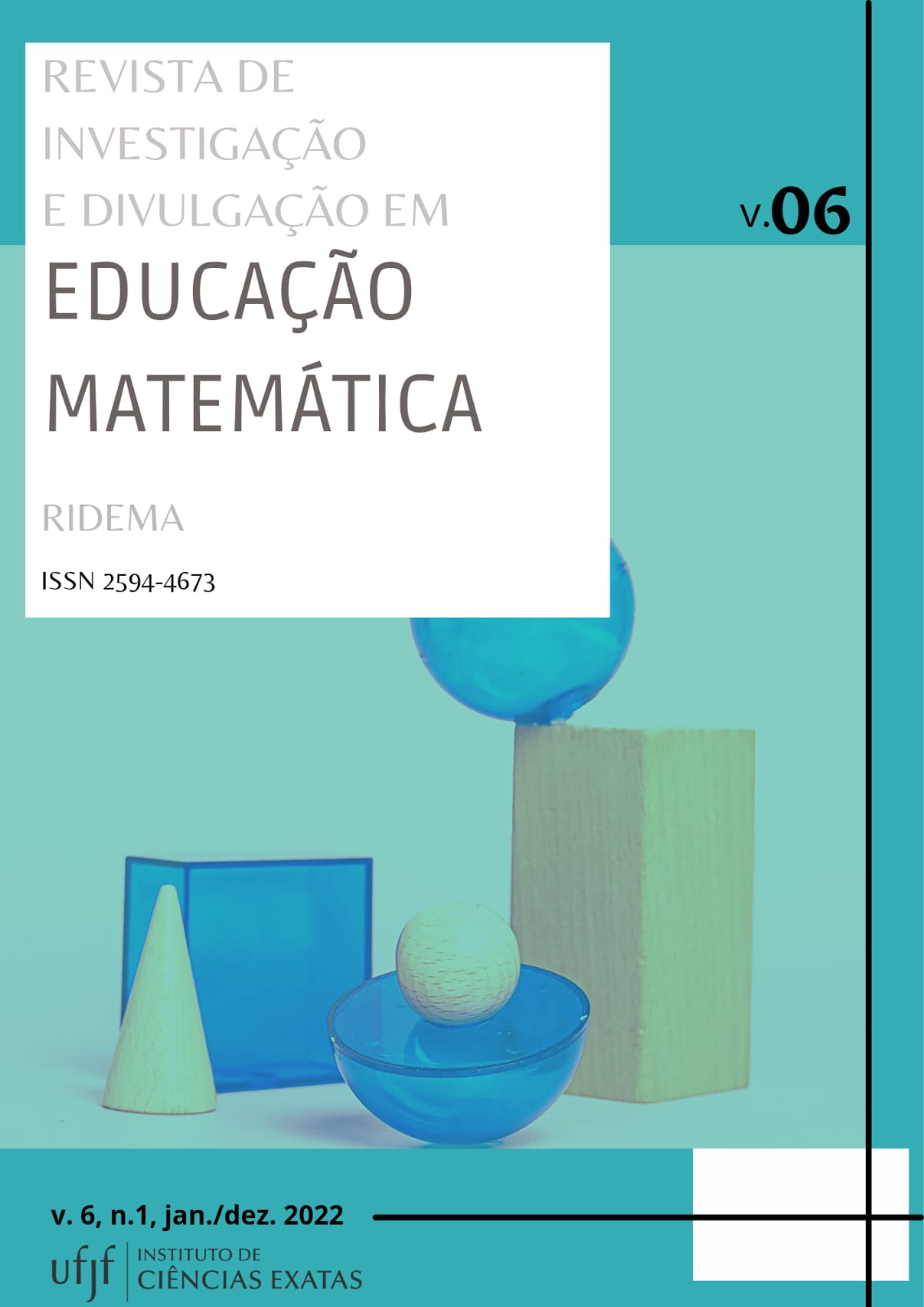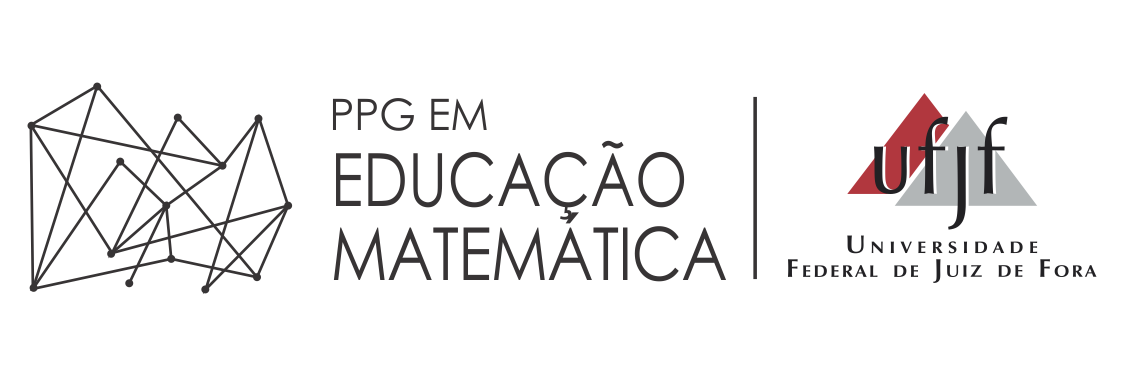Analisando as Ações para o Desenvolvimento da Atividade Criativa dos Estudantes nas Tarefas de Matemática
DOI:
https://doi.org/10.34019/2594-4673.2022.v6.36232Palabras clave:
Atividade Criativa; Teoria da Atividade; Atividade Orientadora de Ensino; Clube de Matemática.Resumen
O presente artigo apresenta uma discussão sobre as ações que mobilizam a formação da atividade criativa dos estudantes no ensino da Matemática, por meio da Atividade Orientadora de Ensino (AOE). Fundamentado na Teoria da Atividade, de Leontiev (2004), este estudo tem como objetivo identificar elementos que caracterizam as ações que levam os estudantes à formação da atividade criativa, em situações desencadeadoras de aprendizagem organizadas na perspectiva da AOE. Utilizamos como metodologia a pesquisa documental, realizando busca por artigos no banco de dados da plataforma Google Acadêmico. Identificamos nos trabalhos selecionados situações em que se caracteriza a criatividade dos estudantes. Ao fazer essa relação entre as situações desencadeadoras de aprendizagem e a AOE, observamos ações que mobilizaram os estudantes para a formação da atividade criativa. Desse modo, a resolução coletiva do problema pode promover uma nova reflexão da realidade e ajudar os estudantes a encontrar diferentes caminhos para resolver novos problemas. Isso é desencadeado quando há uma estreita relação entre a atividade de ensino do professor com a atividade de aprendizagem do aluno.
Descargas
Métricas
Citas
BOROWSKY, H. G. A Atividade Orientadora de Ensino como princípio do Clube de Matemática. Obutchénie. Revista de Didática e Psicologia Pedagógica, v. 4, n. 2, p. 509-533, 25 set. 2020. https://doi.org/10.14393/OBv4n2.a2020-57494.
CARAÇA, B. de J. Conceitos fundamentais da Matemática. 9. ed. Lisboa: Livraria Sá da Costa Editora, 1989.
DAVIDOV, V. V. Tipos de generalización en la ensenanza. Havana: Pueblo y Educación, 1982.
DIAS, M. da S.; AMARAL, C. C. F. do. O conceito matemático de área na Atividade Orientadora de Ensino. Obutchénie. Revista de Didática e Psicologia Pedagógica, v. 4, n. 2, p. 460-482, 25 set. 2020. https://doi.org/10.14393/OBv4n2.a2020-57491.
KOPNIN, P. V. A dialética como lógica e teoria do conhecimento. Rio de Janeiro: Editora Civilização Brasileira, 1978.
LABORDE, C. Duas utilizações complementares da dimensão social nas situações de aprendizado da Matemática. In: GARNIER, C.; BEDNARZ, N.; ULANOVXKAYA, I. (Org.). Após Vygotsky e Piaget: perspectivas social e construtivista. Escolas russa e ocidental. Porto Alegre: Artes Médicas, 1996, p. 29-46.
LEONTIEV, A. N. O desenvolvimento do psiquismo. 2. ed. São Paulo: Centauro, 2004.
LEONTIEV, A. N. Uma contribuição à Teoria do Desenvolvimento da psique infantil. In: VIGOTSKI, L. S.; LURIA, A. R.; LEONTIEV, A. N. Linguagem, desenvolvimento e aprendizagem. 14. ed. São Paulo: Ícone, 2016, p. 59-83.
LOPES, A. R. L.; BOROWSKY, H. G.; BINSFELD, C. D. O jogo como orientador da prática pedagógica nos anos iniciais do ensino fundamental. Cad. Pesq., São Luís, v. 24, n. Especial, p. 176-191, set/dez, 2017. http://dx.doi.org/10.18764/2178-2229.v24n.especialp176-191.
MORETTI, V.D. O problema lógico-histórico: aprendizagem conceitual e formação de professores de Matemática. Poiésis, Tubarão. Número Especial, p. 29-44, jan/jun, 2014. http://dx.doi.org/10.19177/prppge.v8e0201429-44.
MOURA, M. O. de. A atividade de ensino como unidade formadora. Bolema, ano II, no 12, 1996, p. 29-43.
MOURA, M. O.; ARAUJO, E. S.; SOUZA, F. D. de; PANOSSIAN, M. L.; MORETTI, V. D. A Atividade Orientadora de Ensino como unidade entre ensino e aprendizagem. In: MOURA, M. O. de (Org.). A atividade pedagógica na teoria histórico-cultural. Campinas: Autores Associados, 2016, p. 93-125.
MOURA, M. O. de; ARAUJO, E. S.; SERRÃO, M. I. B. Atividade Orientadora de Ensino: fundamentos. Linhas Críticas, [S. l.], v. 24, 2019. DOI: 10.26512/lc.v24i0.19817. Disponível em: https://periodicos.unb.br/index.php/linhascriticas/article/view/19817. Acesso em: 25 jun. 2021.
MOURA, M. O.; SFORNI, M. S. de F.; ARAÚJO, E. S. Objetivação e apropriação de conhecimentos na atividade orientadora de ensino. Rev. Teoria e Prática da Educação, v. 14, n. 1, p. 39-50, jan./abr. 2011. https://doi.org/10.4025/tpe.v14i1.15674.
NÚÑEZ, I. B. Sistema de princípios didáticos derivados da teoria de Galperin, do enfoque histórico-cultural de Vygotsky e da teoria da atividade de Leontiev. In: NÚÑEZ, I. B. Vygotsky, Leontiev e Galperin: formação de conceitos e princípios didáticos. Brasília: Liber Livro, 2009, p. 129-148.
POZEBON, S.; KLEIN, M.L.; NORO, I.M. Possibilidades para ensinar e aprender sobre volume e capacidade nos anos iniciais do Ensino Fundamental. Vidya, v. 40, n. 2, p. 335-353, jul.-dez. 2020, Santa Maria-RS. https://doi.org/10.37781/vidya.v40i2.3344.
ROSA, J. E. da; DE MATOS, C. F. Atividade orientadora de ensino e proposição davydoviana na organização do ensino de Matemática. Obutchénie. Revista de Didática e Psicologia Pedagógica, v. 1, n. 4, p. 69-91, 23 maio 2018. https://doi.org/10.14393/OBv2n1a2018-4.
RUBTSOV, V. A atividade de aprendizado e os problemas referentes à formação do pensamento teórico dos escolares. In: GARNIER, C.; BEDNARZ, N.; ULANOVXKAYA, I. (Org.). Após Vygotsky e Piaget: perspectivas social e construtivista. Escolas russa e ocidental. Porto Alegre: Artes Médicas, 1996.
VIGOTSKI, L. S. Imaginação e criatividade na infância. 2. ed. São Paulo: Martins Fontes, 2018.
VYGOTSKY, L. S. A Formação Social da Mente. São Paulo: Martins Fontes, 1994.



























